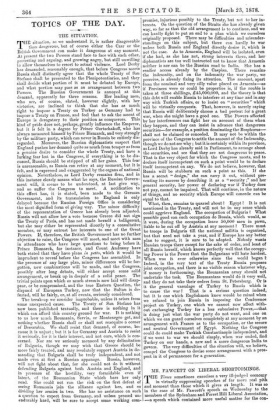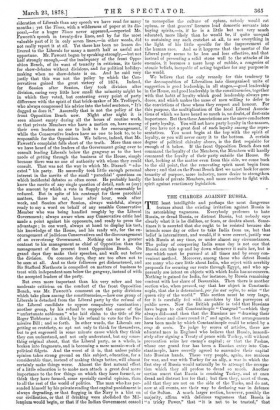MR. FAWCETT ON LIBERAL SHORTCOMINGS.
THE Times sometimes exercises a very ill-judged economy in virtually suppressing speeches of far more real pith and moment than those which it gives at length. It was so in the case of Mr. Fawcett's speech on Wednesday to the members of the Sydenham and Forest Hill Liberal Association, —a speech which contained more useful matter for the con- sideration of Liberals than any speech we have read for many months ; yet the Times, with a wilderness of paper at its dis- posal,—for a huger Times never appeared,—reported Mr. Fawcett's speech in twenty-five lines, and by far the most valuable part of it in only seven lines,—in other words, did not really report it at all. Yet there has been no lesson de- livered to the Liberals for many a month half as useful and opportune. Mr. Fawcett began by speaking strongly,—but not half strongly enough,—of the inadequacy of the front Oppo- sition Bench, of its want of tenacity in criticism, its taste for show-debates without divisions, and for political holiday- making when no show-debate is on. And he said very justly that this was not the policy by which the Con- servatives gained the great victory of 1874. Indeed, for Session after Session, they took division after division, caring very little how small the minority might be in which they voted, but contesting every point of party difference with the spirit of that brick-maker of Mr. Trollope's, who always compressed his advice into the brief sentence, " It's dogged as does it." Assuredly that is not the policy of the front Opposition Bench now. Night after night it is seen almost empty during all the hours of routine work, so that private Members who have a motion on, have among their own leaders no one to look to for encouragement, while the Conservative leaders have no one to look to, to be responsible for the Opposition. We believe, indeed, that Mr. Fawcett's complaint falls short of the truth. More than once we have heard of the leaders of the Government going over to consult leading Liberals below the gangway as to the best mode of getting through the business of the House, simply because there was no one of authority with whom they could consult. That was not the way in which Mr. Disraeli " edu- cated " his party. He assuredly took little enough personal interest in the merits of the small parochial' questions on which incidental debates so often occur. He probably hardly knew the merits of any single question of detail, such as (say) the amount by which a vote in Supply might reasonably be reduced. But in spite of his contempt for these parochial matters, there he sat, hour after hour, week after week, and Session after Session, always watchful, always ready to say a word on behalf of any sensible Conservative Member who was being handled roughly by the Liberal Government ; always aware when any Conservative critic had made a point against his opponents, and ready to press the advantage ; in one word, always at hand to display his tact, his knowledge of the House, and his ready wit, for the en- couragement of judicious Conservatives and the discouragement of an over-strong Government. Nothing can be a greater contrast to his management as chief of Opposition than the management of the present front Opposition Bench. On grand days they make their speeches, and walk out before the division. On common days, they are too often not to be seen at all. And so their followers get disheartened, and Sir Stafford Northcote is compelled on matters of business to treat with independent men below the gangway, instead of with the accepted leaders of the party.
But even more important than his very sober and too moderate criticism on the conduct cf the front Opposition Bench, was Mr. Fawcett's comment on the petty divisions which take place among the constituencies,—how one group of Liberals is detached from the Liberal party by the refusal of the Liberal candidate to oppose compulsory vaccination ; another group, by his refusal to support the cause of the " unfortunate nobleman " who laid claim to the title of Sir Roger Tichborne ; a third, by his refusal to vote for the Per- missive Bill ; and so forth. In other words, the Liberals are getting so crotchety, so apt not only to think for themselves, but to get engrossed in some minute cause which they think they can understand, and not only understand, but say some- thing original about, that the Liberal party, as a whole, is broken into fragments, and is becoming a mere mosaic-work of political fidgets. And the worst of it is, that unless public opinion takes strong ground on this subject, education, for a considerable time, instead of making things better, will almost certainly make things worse. Almost the first natural effect of a little education is to make men attach a great deal more importance to the few things on which they have formed, or think they have formed, some specially careful opinion, than to all the rest of the world of politics. The man who has per- suaded himself by his private reading that capital punishment is always degrading, or that flogging in the Navy is a blot on our civilisation, or that if drinking were abolished the Mil- lennium would begin, or that if the Indian Government ceased to monopolise the culture of opium, nobody would eat opium, or that grocers' licences lead domestic servants into buying spirits,—is, if he is a little but not very much educated, more likely than he would be, if quite unequal to sustaining any such crotchet at all, to see everything in the light of his little specific for the improvement of the human race. And so it happens that the mortar of the Liberal party seems to be less and less effective, and that instead of presenting a solid stone wall to the attacks of its enemies, it becomes a mere heap of rubble, a congeries of atomic beliefs, incapable of acting together for any purpose in the world.
We believe that the only remedy for this tendency to the decomposition of Liberalism into disorganised units of suggestion is good leadership, in all stages,—good leadership in the House, and good leadership in the constituencies, together with that habit of loyalty which good leadership always pro- duces, and which makes the mass of men willing to defer to the convictions of those whom they respect and honour. For this purpose, the multiplication of the local Liberal Associa- tions of which we have heard so much is, no doubt, of first-rate importance. But then these Associations are the mere conductors of party loyalty. You will not have party loyalty in the masses, if you have not a great deal of such loyalty among the repre- sentatives. You must begin at the top with the spirit of loyalty, or you will never carry it to the bottom. A certain degree of political chivalry above, is the first requisite for enough of it below. If the front Opposition Bench does not command the loyalty of the Members, the Members will hardly command the loyalty of their party outside the House. So that, looking at the matter even from this side, we come back to the old point, that the renovating spirit must begin from above ; and that on the Front Bench first we must look for more tenacity of purpose, more industry, more desire to strengthen the hands of private Members, and more resolve to fight with spirit against reactionary legislation.



































 Previous page
Previous page